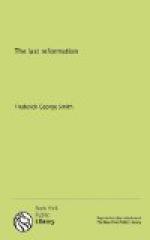[Sidenote: Was divinely attested]
Paul was given a tremendous task—“TO MAKE ALL MEN SEE” that mystery. This task required from God “the effectual working of his power” (verse 7). And in another place he also shows that this power was not lacking: “For I will not dare to speak of any of those things which Christ hath not wrought by me, to make the Gentiles obedient, by word and deed, through mighty signs and wonders, by the power of the Spirit of God” (Rom. 15: 18, 19).
Paul, then, was divinely commissioned “to make all men see” the mystery of this union of all classes of men “in one body by the cross” (Eph. 2: 16), all in “the SAME body, and partakers of his promise in Christ by the gospel” (Eph. 3: 6). And when Paul’s career was finished, the same mystery was given over to others that it might be “known BY THE CHURCH” (verse 10), “the church, which is his body” (Eph. 1: 22, 23). The ministry, then, should have held the ground already attained, the actual union of all the saved in one body, and have labored earnestly “to make all men see” that that body only is the church.
CHAPTER III
THE LOCAL CHURCH
The words of Christ, “I will build my church; and the gates of hell shall not prevail against it” (Matt. 16: 18), convey a deeper meaning than the simple preaching of the kingdom. As we have already shown, the one specific personal act by virtue of which Christ became the founder of the church was his atonement on Calvary, where the church was “purchased with his own blood” (Acts 20: 28). The church, then, as an institution, resulted from the atonement. Paul, describing the union of Jews and Gentiles in one body, the church, declares that it was effected “by the cross” (Eph. 2: 16).
There was power in redemption. It brought into the lives of believers forces that could not but unite them in social compact. It threw them together in living sympathy and united their hearts firmly in the strong bonds of brotherly love. Their outward organic union as a church was the natural and inevitable result of this inward life and love.
[Sidenote: Local church defined]




